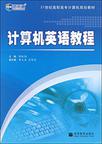计算机英语教程新航道英语学习丛书
出版时间:2008-6 出版社:高等教育出版社 作者:陈秋劲 编 页数:184
前言
随着信息化的普及,现代生活与计算机的结合日益全面和紧密。可以说,信息技术已经成为推动社会进步的重要生产力。而随着全球一体化的进程加速,英语不仅成为“地球村”最普遍的日常用语和官方用语,更是信息技术领域的重要交流工具。不懂计算机专业英语,就无法深入掌握信息技术,无法和国内国际同行进行平等对话,这将是计算机从业人员事业发展的一个“瓶颈”。而我们编撰此书的目的,就是为了帮计算机专业的学生们突破未来的事业“瓶颈”,为将来的事业发展打下更坚实的基础。 编撰此书的老师,常年在高等院校一线从事科研与教学,他们精通计算机技术和计算机专业英语的运用,了解这个领域的最新信息,熟悉计算机专业学生应习得的知识结构,所以,他们把教学艺术充分运用到该书的编撰中,突出了全面性、新颖性和适中性。全面性体现在全书的14单元几乎囊括了计算机专业技术的方方面面;新颖性则体现在计算机相关知识面中加入了信息技术的最新发展动态;适中性主要体现为选择文章的难度标准相对适中,编排由浅入深,一步步引领学生进入计算机专业英语的世界。 该书的每个单元都有两篇规范的英文科技文章作为核心阅读材料,配以核心词汇、强化训练、知识补充、参考答案。通过这本教材,您能够学习到计算机技术专业领域的重要词汇,熟悉英文科技文章的样式,补充相关专业知识表达,以此来掌握学习前沿信息技术的方法。 本书由陈秋劲主编,李大庆,范智宏为副主编,其中陈秋劲负责全书整体结构的设计和教材内容的审核,李大庆编写了第3单元、第9单元和第10单元,王娜和刘颖共同编写了第2单元和第11单元,范智宏编写了第5单元,杜丽霞编写了第6单元、第7单元和第8单元。参加本书编写和审校等工作的还有徐红霞,任艳玲,朱静宜,石旱和陈翠红等。
内容概要
《计算机英语教程》选取最新的计算机专业技术资料,由浅入深地介绍了计算机专业的基础及核心知识,其中包括计算机硬件基础知识、计算机软件编程技术、计算机网络及万维网等专业知识。 本书既不同于一般汉语版计算机专业英语教材对知识点的强调,也有别于英语原版的专业教材对相关背景和知识的要求和限制,它将两者的特点有机结合,让学生在学习的过程中既获得必需的专业知识,也培养学生在英文语境下进行专业知识学习的能力。 本书的适用对象为计算机应用及相关电子类专业高职高专学生,也可供广大计算机爱好者和英语爱好者学习和参考。
书籍目录
Unit 1 Personal Computer SystemUnit 2 System HardwareUnit 3 System SoftwareUnit 4 Application SoftwareUnit 5 Program DesignUnit 6 Data StructureUnit 7 DatabaseUnit 8 MiddlewareUnit 9 Software EngineeringUnit 10 Computer NetworksUnit 11 Applications of the IntemetUnit 12 Information SearchUnit 13 Web 20 TimesUnit 14 Computer SecurityAppendix 1Appendix 2Answers
章节摘录
Data Structure was not taught as an independent course at colleges in Western countries until 1968. From then on, it has developed into one of the core subjects combining mathematics, computer hardware and software in computer science. It is not only the basis of general programming design, but also the foundation for designing and accomplishing compiling program[1], operation system, database system and other system programs. In computer science, the data structure is a study of data elements as well as the relationship between them in programming design. Within large programs, computers can store and process vast amounts of these data elements. Formal data structures enable a programmer to mentally structure large amounts of data into conceptually manageable relationships. Sometimes we use data structures to allow us to do more: for example, to accomplish fast searching or sorting of data. Other times, we use data structures so that we can do less: for example, the concept of the stack is a limited form of a more general data structure. These limitations provide us with guarantees that allow us to reason our programs more easily. Data structures also provide the guarantees of algorithmic complexity——choosing an appropriate data structure for a task is crucial for writing good software. BeCause data structures are higher-level abstraction, they present to us operations on groups of data,such as adding an item to a list, or looking up the highest-priority item in a queue. When a data structure provides operations, we can call the data structure an abstract data type(sometimes abbreviated as ADT).
图书封面
评论、评分、阅读与下载
用户评论 (总计0条)
推荐图书
- 高中数学 选修2-1
- 倍速训练法
- 倍速学习法
- 教材知识详解高中数学
- 倍速学习法
- 高中数学选修1-1
- 倍速训练法
- 09秋成功单元计划(1年级上)
- 冠军夺标方案(下)
- 冠军夺标方案II:九年级物理(上)(沪科版) (平装)
- 冠军夺标方案Ⅱ九年级数学(下)
- 冠军夺标方案II(上)
- 冠军夺标方案Ⅰ九年级数学(上)
- 冠军夺标方案Ⅱ一年级语文(下)
- 冠军夺标方案II(上)
- 高中化学 选修5-有机化学基础
- 冠军夺标方案Ⅰ二年级数学(下)
- 冠军夺标方案Ⅰ二年级语文(下)
- 冠军夺标方案(下)
- 冠军夺标方案Ⅰ二年级数学(上)
- 倍速学习法
- 高中化学
- 七年级英语·上
- 冠军夺标方案(下)
- 冠军夺标方案Ⅱ九年级数学(下)
